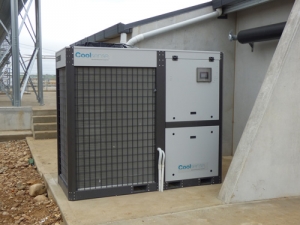Refrigeration equipment specialist Coolsense says their new milk chilling system will help Canterbury farmers meet updated cooling regulations and save on energy costs.
The system will be on display at this week’s Ashburton A & P Show.
New regulations, which come into effect mid next year, require milk to be chilled to six degrees Celsius within two hours of milking. 440 of Canterbury’s dairy farms (close to 40%) will need to take action to meet the new standards, with some requiring a total upgrade of their milk chilling systems.
The Energy Efficiency and Conservation Authority has co-funded the installation of the new plant at Rylib Dairies Fairmont Farm at Hinds. Designed to save on farmer’s energy costs, the project is part of EECA’s technology demonstration programme.
Hamilton based refrigeration equipment specialist, Coolsense, developed the system. Coolsense says it not only allows compliance with the 2016 cooling standards, but it also means lower power consumption on the farm. The system also produces hot water as a by-product.
The average New Zealand dairy spends over $20,000 a year on electricity. EECA projects and relations manager, Kirk Archibald, says any energy savings are a big bonus for farmers.
“It’s expensive to run a dairy farm and there are a lot of fixed costs that farmers can’t skimp on such as feed and vet bills,” says Archibald.
“Energy is a controllable cost and makes up about five% of the cost of running a farm. If you can reduce your energy spend the savings can be ploughed back into the farm or used in leaner months to keep the farm going.”
Rylib Dairies milks 820 cows twice daily and has been operating the new plant since February.
“It’s been fantastic,” says assistant farm manager, Scott Armstrong. “The biggest benefit has been the cost savings. Because the milk goes into the vat at 6 degrees Celsius it’s at the temperature for pick up and we’re saving a third on our chilling costs.”
“We’re also saving on the cost of hot water. The heat recovery gives us 1,500 litres of hot water a day to wash our equipment.”
Armstrong says over the months of August and September the farm saved $2,055 and 8821 kilowatts of power, which equates to a reduction of 28% in kilowatt units per kilogram of milk solids on the previous year.
“With milk volumes continuing to increase we expect these savings to increase over the year and are delighted with this outcome,” says Armstrong.
Farmers interested in learning more about this energy saving technology will be able to see one of the units in operation at the Ashburton A & P Showgrounds, Brucefield Avenue, on October 30-31.


















